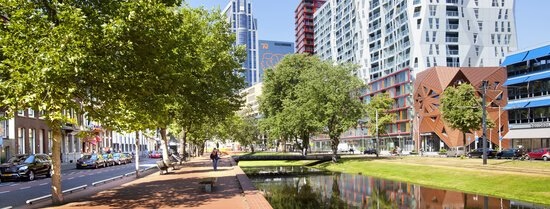13h30-15h: Neighbourhood Effects and Segregation over the Life Course
By Prof.Dr. Maarten van Ham
Cities are getting more and more segregated: the poor and the rich are increasingly living in different neighbourhoods and different parts of the city (centre and suburb). More affluent households live more segregated than lower income household, which is an effect of their higher income, which buys them into the best neighbourhoods. A high level of socio-economic residential segregation is related to high levels of segregation in schools, but also leisure time activities and workplaces. The higher levels of income inequality, the more segregation there is. And segregation is transmitted from one generation to the next. This session will discuss how different forms of segregation are linked in time and space, and how policy can help to break the vicious circles of segregation.
About the lecturer:
Maarten van Ham is Professor of Urban Renewal and head of the Urban and Neighbourhood Change research group at the Department OTB - Research for the Built Environment, TU Delft. Maarten is a population geographer with a background in economic and urban geography; is a Research Fellow at IZA; and Professor of Geography at the University of St Andrews. In 2014, Maarten was awarded a 2 million Euro ERC Consolidator Grant for a 5-year research project on neighbourhood effects (DEPRIVEDHOODS).
15h30 – 17h: Who is Afraid of Rotterdam? How a Post-Industrial City Tries to ‘Engineer’ Its Population
By Dr. Reinout Kleinhans
The city of Rotterdam has gone through a remarkable development since the turn of the millennium. As a former working-class harbour city, it used to be “at the top of the wrong rankings” regarding poverty, unemployment, crime and other forms of deprivation. However, guided by consecutive right-wing city governments, Rotterdam has deliberately implemented a number of policies that try to change the composition of its population in terms of socio-economic background. This session will show how Rotterdam has enacted a number of interventions and strategies that revolve around the notions of gentrification, “strong shoulder” (resourceful residents), and transforming the urban housing stock in ways that attract affluent households to the city.
About the lecturer:
Reinout Kleinhans is Associate Professor of Urban Regeneration at the Faculty of Architecture and the Built Environment of TU Delft. His research interests are urban regeneration, self-organisation, community entrepreneurship, online/offline citizen engagement, social capital and collective efficacy. He is currently involved in international comparative research on community enterprises and other forms of citizen-based co-production and residential area redevelopment as well as in the JPI ERA-NET research on Smart Urban Governance, studying the G2C / C2G co-production potential of social media, mobile technologies and participatory platforms in neighbourhood governance and self-organisation.
